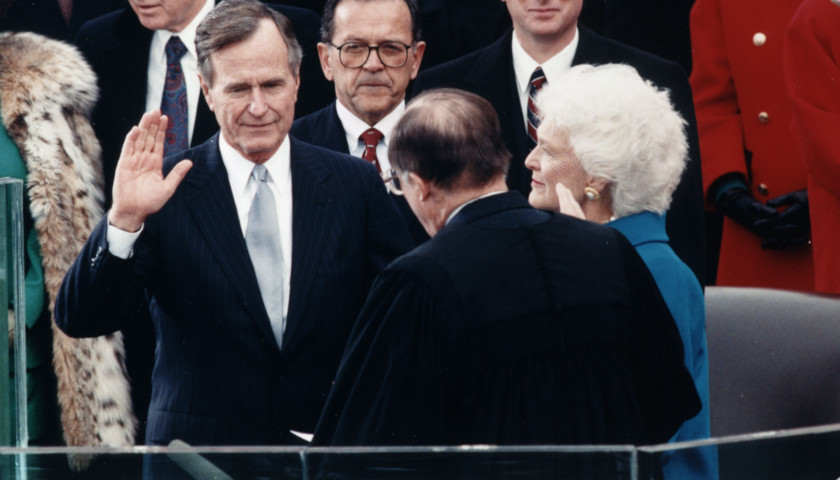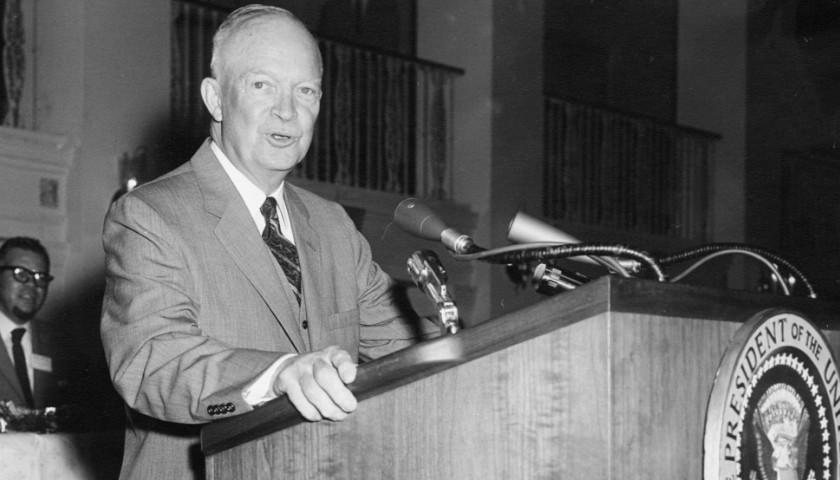by Richard A Viguerie
As the establishment media rushes to make the late President George H.W. Bush a saint of bipartisanship conservatives ought to remember the real George H.W. Bush and heed the political lessons available from an honest review of his record.
Patriot, a public servant in the sense that the old Republican establishment viewed politics, and a paragon of old-fashioned public decorum and virtue he most certainly was, but he was, just as certainly, not a conservative.
Those of us who have been around conservative politics for a while remember the smirk on Democratic senator George Mitchell’s face when he conned George H. W. Bush into abandoning his “read my lips” promise to oppose new taxes.
If “Read my lips: no new taxes,” was the most memorable line of the 1988 campaign, George H. W. Bush’s decision to abandon that commitment was, politically, the most momentous act of his presidency.
The decision to go back on his pledge not to raise taxes didn’t take place until well into his term. But Bush’s betrayal of the Reagan Revolution started the minute he took the oath of office.
Within hours of Bush’s inauguration establishment Republicans, such as James Baker III, who had opposed many of Reagan’s initiatives from within the administration, were promoted. But throughout the government Reagan’s conservative appointees, many of whom were loyal Republicans who had supported Bush, were forced to resign, were stripped of their duties, or were summarily fired by a new administration that wanted no part of the relatively few movement conservatives left in the government on the day Ronald Reagan departed Washington for California.
During Reagan’s presidency conservatives frequently said, “Personnel is policy,” and Bush’s Inauguration Day massacre was a sure sign that he intended to abandon Reagan’s policies, and his principles.
While most commentators tend to focus on “Read my lips,” Bush quickly walked away from conservative principles on a long list of policies and decisions.
• Bush reversed himself and imposed a temporary ban on semiautomatic rifles—so-called assault weapons—after first opposing the idea.
• He signed and advocated the Americans with Disabilities Act, creating a whole new realm of litigation nightmares for businesses large and small.
• He bailed out the troubled savings and loans banks.
• He signed the Civil Rights Act of 1990, making it easier for employees to sue employers.
• He bought into global warming by signing the Framework Convention on Climate Change.
• He created a “no net loss of wetlands” policy out of whole cloth, with little legislative authority, outraging farmers and landowners across the country.
• And in what was perhaps his most lasting and damaging betrayal of conservatives, he appointed an obscure state judge, David Souter of New Hampshire, to the Supreme Court.
I could go on—the point is, establishment media commentators tend to focus on “Read my lips” to sum up Bush’s administration, but there were a host of policies where Bush deviated not just from Reagan’s principles of government, but from conservative policy goals that had broad grassroots support.
While it was hard for Bush and his advisers to believe that he could go from over 90 percent approval when Operation Desert Storm ended in 1991, to getting just 37.5 percent of the popular vote in the 1992 election, it is easily explained when you look at the litany of me-too policies he backed and the liberal bills he signed.
Support for the Second Amendment and property rights, imposing moral hazard, instead of government bailouts for failed business transactions and investors, and opposing the creation of new “protected classes” of potential litigants were all broad conservative, and Republican, principles that predated Ronald Reagan. Bush walked away from all of them and in the process not only abandoned the policies of Ronald Reagan, but he destroyed the Reagan coalition, and did serious and long-lasting damage to the Republican brand.
It will be hard for many establishment figures to accept that assessment, and no doubt I will be accused of being unkind, but one only needs to look at the Contract with America to recognize that to regain the majority in Congress and to rebuild the Republican brand, Republicans had to run away from George H.W. Bush.
Never before had Republicans engaged in an effort to so completely expunge the legacy of a Republican president only two years after his defeat, since practically everything in the Contract with America was intended to scream at voters, “We’re not George Bush!” and at least one of the provisions of the Contract, that on compensation of property owners, was intended to mitigate the harm caused by Bush’s wetlands policy.
At his passing we can and should celebrate George H.W. Bush the war hero, family man, and a human being notably generous to friends and staff.
However, in the age of President Donald J. Trump, those who draw unflattering comparisons between Bush and Trump and wax nostalgic for George H.W. Bush’s public decorum and old-fashioned Protestant rectitude want Americans to forget that behind the gentlemanly exterior was a politician whose policies were anything but conservative, and whose greatest political legacy was breaking the Reagan coalition and undoing many of Ronald Reagan’s hard-won victories.









Extremely well-stated. The exaltations are nauseating when one knows of the unspoken betrayals.